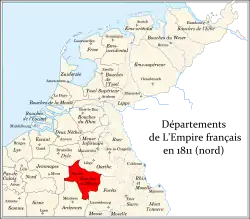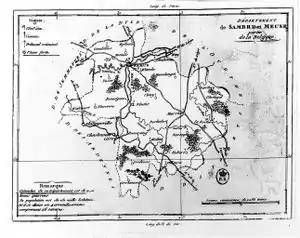Department of Sambre-et-Meuse | |||||||||||
|---|---|---|---|---|---|---|---|---|---|---|---|
| 1795–1814 | |||||||||||
 | |||||||||||
 Sambre-et-Meuse and other annexed departments | |||||||||||
| Status | Department of the French First Republic and the French First Empire | ||||||||||
| Chef-lieu | Namur 50°28′N 4°52′E / 50.467°N 4.867°E | ||||||||||
| Official languages | French | ||||||||||
| Historical era | French Revolutionary Wars | ||||||||||
• Creation | 1 October 1795 | ||||||||||
• Treaty of Paris, disestablished | 30 May 1814 | ||||||||||
| Population | |||||||||||
• 1814[1] | 180,655 | ||||||||||
| |||||||||||
| Today part of | |||||||||||

Sambre-et-Meuse ([sɑ̃bʁ e møz]) was a department of the French First Republic and French First Empire in present-day Belgium. It was named after the rivers Sambre and Meuse. It was created on 1 October 1795, when the Austrian Netherlands and the Prince-Bishopric of Liège were officially annexed by the French Republic.[2] Prior to this annexation, the territory included in the department had lain in the County of Namur, the Prince-Bishopric of Liège and the Duchies of Brabant and Luxembourg.
The Chef-lieu of the department was Namur. The department was subdivided into the following four arrondissements and cantons:
- Namur: Andenne, Dhuy, Fosses, Gembloux and Namur (2 cantons).
- Dinant: Beauraing, Ciney, Dinant, Florennes and Walcourt.
- Marche: Durbuy, Érezée, Havelange, La Roche, Marche and Rochefort.
- Saint-Hubert: Gedinne, Nassogne, Saint-Hubert and Wellin.
After Napoleon was defeated in 1814, the department was dissolved and later became part of the United Kingdom of the Netherlands. Its territory is now divided between the Belgian provinces of Namur and Luxembourg.
Administration
Prefects
The Prefect was the highest state representative in the department.
| Term start | Term end | Office holder |
|---|---|---|
| 2 March 1800[3] | 17 April 1806 | Emmanuel Pérès de la Gesse |
| 3 January 1814[4] | 30 May 1814 | Jean Paul Alban de Villeneuve-Bargemon |
Secretaries-General
The Secretary-General was the deputy to the Prefect.
| Term start | Term end | Office holder |
|---|---|---|
| 2 March 1800 | ?? ?? 1803 | Corneille Joseph Bauchau |
| ?? ?? 1803 | 30 May 1814 | L.A. Fallon |
Subprefects of Dinant
| Term start | Term end | Office holder |
|---|---|---|
| 23 April 1800[1] | 7 April 1813 | Louis Joseph Delevingne |
| 7 April 1813[1] | 30 May 1814 | Claude François Prudhomme |
Subprefects of Marche
| Term start | Term end | Office holder |
|---|---|---|
| 23 April 1800[1] | 24 May 1800 | Dewal |
| 24 May 1800[1] | 30 May 1814 | Jacques François Joseph Briart |
Subprefects of Namur
The office of Subprefect of Namur was held by the Prefect until 1811.
| Term start | Term end | Office holder |
|---|---|---|
| 14 January 1811[1] | 30 May 1814 | Edouard Auxy |
Subprefects of Saint-Hubert
| Term start | Term end | Office holder |
|---|---|---|
| 23 April 1800[1] | 30 May 1814 | Louis Dieudonné Joseph Dewez |
See also
- Le Régiment de Sambre et Meuse - a poem, later set to music, and arranged as a military march.
References
- 1 2 3 4 5 6 7 Tulard, Jean & Marie-José (2014). Napoléon et 40 millions de sujets: La centralisation et le premier empire. p. 354. ISBN 9791021001480.
- ↑ Duvergier, Jean-Baptiste (1835). Collection complète des lois, décrets, ordonnances, réglemens et avis du Conseil d'état, t. 8. p. 300.
- ↑ Archives Nationales. "PÉRÈS DE LA GESSE, Emmanuel". francearchives.fr. Retrieved 21 June 2019.
- ↑ Archives Nationales. "VILLENEUVE-BARGEMON, Jean Paul Alban de". francearchives.fr. Retrieved 21 June 2019.